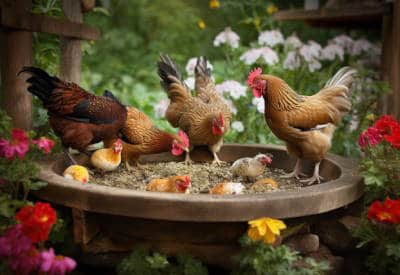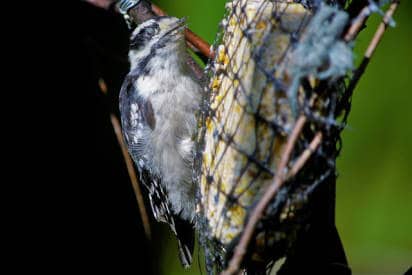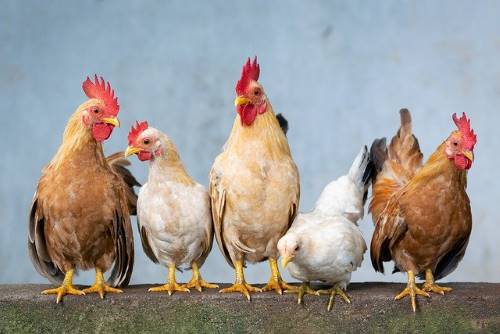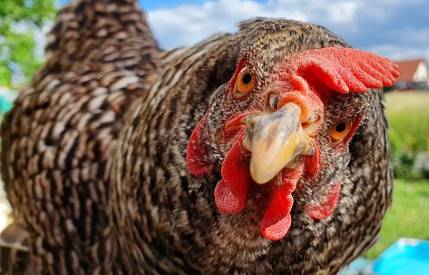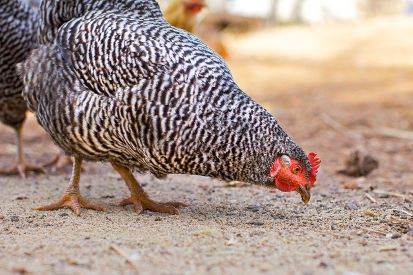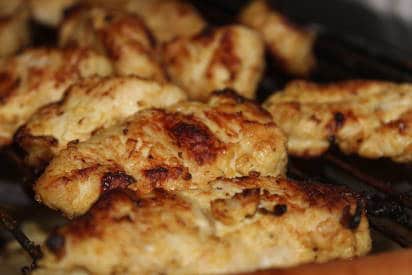Have you ever found yourself gazing at a suet block and wondering, can chickens eat suet? As a chicken owner myself, I’ve had many moments of dietary deliberation about my feathered friends. We naturally ponder what our chickens can and can’t eat, especially when it comes to unusual items like suet.
Here’s the brief answer: yes, chickens can eat suet. It’s not a natural part of their diet, but it’s not harmful in moderation. Suet is rich in fat and protein, which can be beneficial, especially during the colder months. However, like any treat, it should be given sparingly to avoid health issues.
This article will dive deeper into understanding suet and its implications on a chicken’s diet. We’ll cover everything from the basics of suet, the nutritional needs of chickens, to potential benefits and risks of feeding suet to chickens, and finally, some guidelines if you decide to include suet in your chicken’s menu.
Understanding Suet
Before we dive headfirst into the world of chickens and suet, let’s take a moment to understand exactly what suet is.
Definition of Suet
Suet is a type of fat that comes from around cows’ and sheep’s kidneys and other organs. It’s hard at room temperature but melts easily when heated, which makes it a favorite in certain types of cooking.
Typical Use of Suet in Cooking
You’ll often find suet used in traditional British cooking, where it’s a key ingredient in dishes like steak and kidney pie and Christmas pudding. In these recipes, suet adds richness and a distinctive flavor.
Nutritional Content of Suet
As an animal fat, suet is high in calories, fat, and protein. It also contains vitamins and minerals, particularly Vitamin B12 and iron, essential to many bodily functions.
[ChickenAffiliate]
The Chicken Diet
Now that we understand suet let’s look at the nutritional needs and preferences of chickens.
Basic Nutritional Requirements of Chickens
Chickens are omnivores and can eat a variety of foods. They need a balanced diet of proteins, carbohydrates, fats, vitamins, and minerals to stay healthy. This usually comes from a commercial feed, grains, fruits, vegetables, and occasional insects or worms.
Common Foods Chickens Eat
A chicken’s typical diet includes grains, seeds, greens, and bugs, supplemented with fruits and vegetables. Some chicken keepers even provide their flock with kitchen scraps (within reason).
Foods that are Harmful to Chickens
However, not all foods are safe for chickens. Certain foods like chocolate, avocado, and green parts of tomatoes are toxic for them. Also, salty or sugary foods aren’t good for their health.
Suet and Chickens: An Overview
With our understanding of suet and chicken diets, we can now ask the million-dollar question: Can chickens eat suet?
Can Chickens Physically Eat Suet?
Physically, yes, chickens can eat suet. They’re capable of pecking at it and swallowing it as they would with other types of food.
Would Chickens Naturally Eat Suet?
Chickens wouldn’t naturally come across suet in their environment, as it comes from the internal fat of large mammals. However, they are opportunistic eaters and generally eat what’s available.
Common Misconceptions about Chickens and Suet
Some people believe that because wild birds eat suet, it must be good for chickens too. But remember, chickens and wild birds have different dietary needs, so what’s good for one isn’t necessarily good for the other.
Potential Benefits of Suet for Chickens
Suet isn’t a typical part of a chicken’s diet but has potential benefits.
Suet as a Source of Fat and Protein
Suet is high in fat and protein, which is essential for chicken health. Fat provides energy, while protein helps with everything from muscle growth to egg production.
Potential Impact on Egg Production
The extra protein in suet could improve egg production, particularly during the colder months when chickens naturally lay fewer eggs.
Possible Impact on Feather Health
Suet could also contribute to feather health. Feathers are made of protein, so a diet high in protein can help chickens grow strong, healthy feathers.
Potential Risks of Suet for Chickens
But it’s not all sunny-side up regarding chickens and suet. There are some potential risks to be aware of.
Risk of Obesity in Chickens
Like humans, chickens can become overweight if they eat too much fat. Obesity in chickens can lead to a variety of health problems, including heart disease and decreased egg production.
Potential Digestive Issues
Chickens aren’t designed to process large amounts of animal fat. While they can handle some suet, too much could cause digestive issues.
Possible Impact on Heart Health
Suet is high in saturated fat, which isn’t good for heart health in large amounts. While it’s unclear how much this affects chickens, it’s something to keep in mind.
Guidelines for Feeding Suet to Chickens
So, with all this in mind, how should you feed your chickens suet if you choose to do so?
When Should You Feed Suet to Chickens?
Suet can be particularly useful during colder months when chickens need extra calories to keep warm. It can also boost protein during molting season when chickens are regrowing their feathers.
How Much Suet Should You Feed?
Chickens should only be fed suet as a treat, not a main part of their diet. Think of it as chicken cake – a small amount occasionally is fine, but too much can cause problems.
Best Ways to Offer Suet to Chickens
If you decide to feed your chickens suet, it’s best to offer it in small pieces or pebbles. You can also buy suet cakes designed for birds, but check the ingredients first – some may contain other foods that aren’t good for chickens.
Creating Your Own Suet Treats for Chickens
Dabbling in a little chicken-friendly culinary creativity can be both fun and rewarding. If you want to make your own suet treats for your chickens, here’s a simple way.
Gather Your Ingredients
You’ll need suet, of course. You can often find this at your local butcher shop or supermarket. In addition to suet, you can add ingredients like grains, seeds, or dried fruit, which are all safe for chickens and will add extra nutrients. However, avoid adding anything chickens shouldn’t eat, like chocolate or avocado.
Preparation Steps
- Start by melting the suet. You can do this in a pan over low heat. Keep a close eye on it, as it can burn easily.
- Once the suet is melted, add in your other ingredients and stir until everything is well-coated in the suet.
- Pour the mixture into a mold (an old tin or tray would work) and let it cool. Once it’s hardened, you can cut it into chunks suitable for your chickens.
Safety Measures
Store your homemade suet treats in a cool place to prevent them from going rancid. Also, avoid making excessively large batches. Fresh is best when it comes to feeding your chickens!
Suet Alternatives for Chickens
If you can’t find suet or want to shake things up for your chickens, several alternatives can offer similar benefits.
Mealworms
Mealworms are a protein-packed treat that chickens love. They’re great for feather production and can help boost egg-laying, much like suet.
Sunflower Seeds
Sunflower seeds are another good option. They’re high in fat, which can give chickens extra energy, especially during the colder months. Be sure to feed these in moderation, as the high fat content can lead to weight gain if overfed.
Kitchen Scraps
Certain kitchen scraps can also serve as high-protein, high-fat treats. Think along the lines of bits of cheese, leftover lean meats, or peas. Just remember that not all human foods are safe for chickens – always double-check before feeding anything new.
What Other Meat Can Chickens Eat?
Beyond suet, you might consider feeding your chickens many types of meat. Before diving in, remember: chickens are omnivores and can process some amount of meat. However, as with any treat, meat should be offered in moderation, constituting only a small part of their overall diet.
Chicken
As surprising as it may seem, chickens can and will eat chicken. However, feeding your chickens their own species can be an ethical grey area, and there’s also the risk of spreading diseases. Therefore, it’s best to avoid this if possible.
Read More: Can Chickens Eat Chicken? Unraveling The Mystery And Controversy
Ham
Chickens can technically eat ham, but it’s not the best choice for them. Ham is often high in salt, which isn’t good for chickens in large amounts. Plus, the processed nature of most ham isn’t ideal. If you feed your chickens ham, ensure it’s in very small amounts and not a regular occurrence.
Read More: Can Chickens Eat Ham? Discover The Surprising Answer And More
Turkey
Turkey is a safer option for chickens. It’s low in salt and, if cooked, can provide a good source of protein. Just ensure it’s not seasoned, as certain spices and herbs can harm chickens.
Read More: Can Chickens Eat Turkey? Debunking Myths And Offering Guidelines
Beef
Chickens can eat beef, which can be a good source of protein. However, it should be cooked and cut into small pieces to make it easier for them to eat. As with all meats, it should only make up a small part of their diet.
Read More: Can Chickens Eat Beef? Surprising Benefits Revealed
Pork
While chickens can eat pork, it’s not the best option due to its high fat content. Additionally, pork should always be cooked thoroughly before feeding it to chickens, as raw or undercooked pork can contain harmful pathogens. If you do feed your chickens pork, it should be lean, well-cooked, and given in moderation.
Read More: Can Chickens Eat Pork? A Comprehensive Guide To Poultry Diets
Can chickens eat suet – final thoughts
And there we have it, my fellow chicken enthusiasts! We’ve unraveled the mystery of chickens and suet. We learned that suet, that fat from around the kidneys of cows and sheep, while not a natural part of a chicken’s diet, can indeed be eaten by our feathery friends.
However, moderation is key here. The high fat and protein content in suet can offer benefits like potentially improving egg production and supporting feather health, especially during colder months. But remember, too much of a good thing can lead to obesity and other health issues.
When it comes to our beloved cluckers, their health and happiness are paramount. So, if you treat your chickens with suet, ensure it’s done responsibly. Whether you’re just curious or contemplating a winter treat for your flock, I hope you’ve found this deep dive into the world of chickens and suet insightful.
Related Articles:

